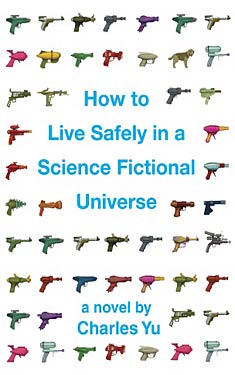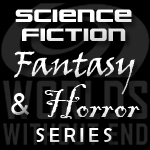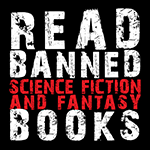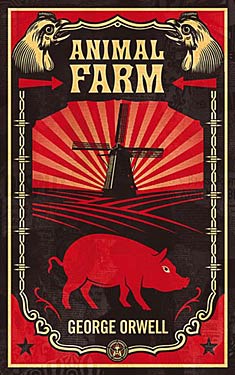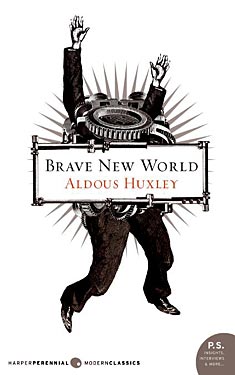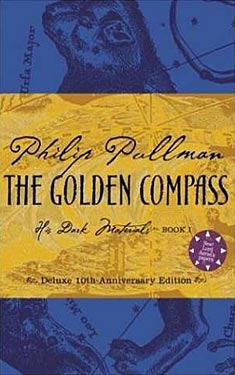Worldcon: Day 2
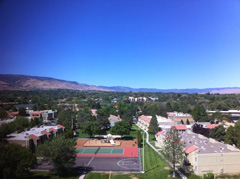 [We continue with Day 2 of Dave’s travel journal. -Jonathan]
[We continue with Day 2 of Dave’s travel journal. -Jonathan]
Rosy-fingered Dawn greeted us on our second day at Worldcon as we arose earlier than intended but eager to get the day started. As tacky as this hotel is, it’s really quite comfortable and we all managed a good night’s sleep – even Rico in the bathroom. Chris and I headed out to the convention center lugging the 5 boxes of bookmarks with us to get things set up while Rico ran some errands.
With no registration line to worry about this time we got things in order straight away and settled in to pimp WWEnd. We could tell that more people had set up shop than on the first day and it looked like we’d have to make the rounds again to see what was new. The crowd was much bigger as well and we had a good deal of traffic past our table. While we got going Rico went out and bought a huge monitor for the table that he slaved to one of the laptops. What a difference that made. 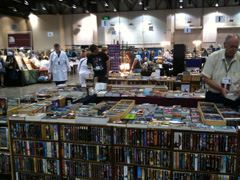 People were drawn to it like moths to a flame and it was much easier to demo the site there than on the much smaller laptop screens. You can see that thing from way down the aisle too. I think a lot of people did not want to get too near to see what we were about because they thought we’d try to sell them something. With the big screen they could see the awards listings and other features we were showing off from afar and they felt more comfortable coming up to the table.
People were drawn to it like moths to a flame and it was much easier to demo the site there than on the much smaller laptop screens. You can see that thing from way down the aisle too. I think a lot of people did not want to get too near to see what we were about because they thought we’d try to sell them something. With the big screen they could see the awards listings and other features we were showing off from afar and they felt more comfortable coming up to the table.
Once Rico and Liz got to the table Chris and I took the opportunity to break out and see some of the programming. We managed to catch only two of the many shows we wanted to see but we didn’t want to leave the other guys stranded at the table. Let me just say that the people who plan these sessions are evil heartless bastards. They scheduled all the bloody shows we wanted to see at the same time so we had to make some agonized decisions on what we’d have to miss. Based on overheard conversations around the convention we were not the only ones to feel the pain.
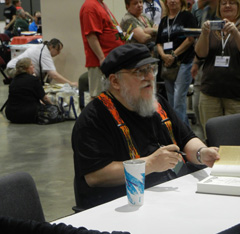 Both of us wanted to go to an author reading and we had to choose between George R. R. Martin and Greg Bear. See what I mean about painful decisions? We settled on Martin but we arrived a few minutes late so I can’t tell you what specifically he was reading but it was pretty cool. The only problem was the speaker volume was low and we had to strain a bit to hear him. Everyone in the room was dead silent and eagerly leaning forward to catch every word like acolytes heading their master.
Both of us wanted to go to an author reading and we had to choose between George R. R. Martin and Greg Bear. See what I mean about painful decisions? We settled on Martin but we arrived a few minutes late so I can’t tell you what specifically he was reading but it was pretty cool. The only problem was the speaker volume was low and we had to strain a bit to hear him. Everyone in the room was dead silent and eagerly leaning forward to catch every word like acolytes heading their master.
After the reading we went to see Valejo Does Tarot. If you’re reading this blog you know who Boris Valejo is. His art is unmistakable and is one of the reasons I got into SF/F in the first place — Chris just likes hot Sci-Fi babes so we were both excited to see him. It turns out that his whole family, wife and two sons, are all artists in their own right and they have been working on a tarot deck for the last few years. 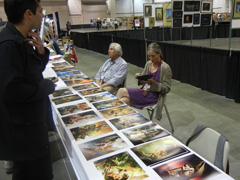 I’m not into Tarot at all but I’ve always loved the imagery on the cards and their take, as evidenced in the slideshow presentation, is especially awesome. The talk was really interesting too as they described their process and methods. Much of the crowd was focused on the mysticism in the cards but plenty there just wanted to see some great art.
I’m not into Tarot at all but I’ve always loved the imagery on the cards and their take, as evidenced in the slideshow presentation, is especially awesome. The talk was really interesting too as they described their process and methods. Much of the crowd was focused on the mysticism in the cards but plenty there just wanted to see some great art.
It was a pretty great day overall and today is shaping up to be another one with the crowds expected to grow even larger. More to come!
NPR: Top 100 Science-Fiction, Fantasy Books
 We have published the controversial NPR Top 100 list of SF/F books in the WWEnd database.
We have published the controversial NPR Top 100 list of SF/F books in the WWEnd database.
From NPR: "More than 5,000 of you nominated. More than 60,000 of you voted. And now the results are in. The winners of NPR’s Top 100 Science-Fiction and Fantasy survey are an intriguing mix of classic and contemporary titles. Over on NPR’s pop culture blog, Monkey See, you can find one fan’s thoughts on how the list shaped up, get our experts’ take, and have the chance to share your own."
Where a series is involved, we show the first book in the series. You can refer to the original list to see which were nominated as series rather than single volumes. Some series are as yet incomplete in our database, but they will all be added soon.
Worldcon: Day 1
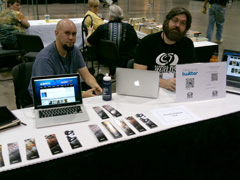 [Our fearless leader Dave has arrived at Worldcon with a few others. This is his first travel journal entry. -Jonathan]
[Our fearless leader Dave has arrived at Worldcon with a few others. This is his first travel journal entry. -Jonathan]
The WWEnd Team finally made it to Reno for Worldcon! We arrived on 4 separate flights from the same city, don’t ask, and hooked up at our hotel – our hopelessly gaudy yet comfortable hotel. This place is all Roman columns, huge flat screen televisions, red neon and gold filigree. Everywhere you look there’s a flat screen showing you scenes from places you’d rather be – Tuscany, Rome, the Mediterranean. The effect is clearly not what they intended.
I’ve not seen much of Reno yet but I am loving the weather! It’s 30 degrees cooler here than it is back home where we’ve had 40+ days of 100 degree weather in a row. What a relief to go outside and not be sweating instantly! All of this means we can walk between the hotel and the convention center and we can get out to some restaurants. This is especially important as the hotel/casino eateries are wicked expensive.
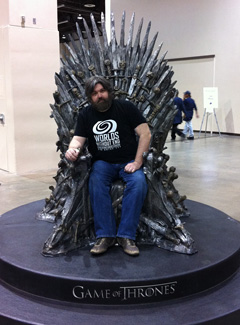 We got to the convention center in the morning and set up our fan table. We had the laptops out to demo the site and had piles of bookmarks there for people to grab. The bookmarks went over really well. Folks liked the designs and even the people who read ebooks, a rather high percentage of the folks we talked to, wanted them so they could get autographs. You can’t really get your ebook signed after all.
We got to the convention center in the morning and set up our fan table. We had the laptops out to demo the site and had piles of bookmarks there for people to grab. The bookmarks went over really well. Folks liked the designs and even the people who read ebooks, a rather high percentage of the folks we talked to, wanted them so they could get autographs. You can’t really get your ebook signed after all.
The site demos were met with enthusiasm as well. We showed off the award pages, especially the Hugo, and the “best of “ lists, the resources pages and reading stats. The folks who stayed long enough to see the stats really got excited when we demoed the comparison feature. They especially liked the cover galleries and that they could browse the books like they would in a bookstore. We were hoping to get people to sign up on the spot but there is a lot to see here and they were ready to move on. We did get lots of promises from people who said they would definitely sign up later so we’re feeling pretty good about that.
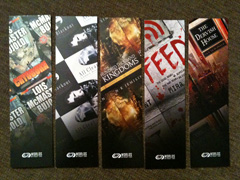 We took turns at the table and wandering the hall and seeing some of the programming. With so many book dealers here it took hours to get around the place. My suitcase will be heavy going back. Of the shows I only managed to get to two of them.
We took turns at the table and wandering the hall and seeing some of the programming. With so many book dealers here it took hours to get around the place. My suitcase will be heavy going back. Of the shows I only managed to get to two of them.
The first was a John Scalzi’s slideshow presentation of his trip to the Creation Museum. Visitors to his Whatever blog challenged him to go and donated money for his trip expecting a full “snarkalicious” report on his return. They were not disappointed! The show was a total riot, as you might well imagine, and was packed to the rafters with giddy fans.
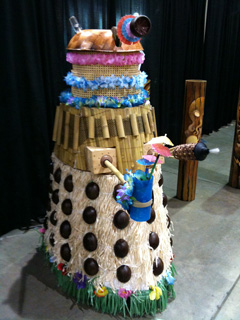 The second show was Dr. Demento! I grew up listening to the Dr. Demento show so I was really keen to see this one. It lived up to the hype. There was Dr. D up on stage in a tux spinning out those funny songs we all know and love and reminiscing of his years in broadcasting. He had a big screen for some videos as well and we were treated to a young Bill Paxton’s first acting gig: Fish Heads! Who knew? There was a lot of Weird Al in the program including his Star Wars/American Pie parody and his first ever recording doing an Elton John tune on the accordion. There were also a couple live performances that were really fun though the song about funky smelling con-goes probably made more than a few attendees nervous.
The second show was Dr. Demento! I grew up listening to the Dr. Demento show so I was really keen to see this one. It lived up to the hype. There was Dr. D up on stage in a tux spinning out those funny songs we all know and love and reminiscing of his years in broadcasting. He had a big screen for some videos as well and we were treated to a young Bill Paxton’s first acting gig: Fish Heads! Who knew? There was a lot of Weird Al in the program including his Star Wars/American Pie parody and his first ever recording doing an Elton John tune on the accordion. There were also a couple live performances that were really fun though the song about funky smelling con-goes probably made more than a few attendees nervous.
After the display room closed went ventured out for some dodgy Chinese food and then went to a couple of the parties at the hotel. We made brief stops at the Texas, Chicago and Spokane bid parties but were pretty tied by that time so we made one more stop at the bar for a quick beer then turned in for the night.
The previous night was not so great with Rico snoring like a cartoon bear with sleep apnea so we rolled his bed into the bathroom and shut the door. He was a good sport about it. Everyone slept well and now we’re off to do it all over again.
How to Live Safely in a Science Fictional Universe by Charles Yu
Guest Blogger, Allie McCarn, reviews science fiction and fantasy books on her blog Tethyan Books which we featured in a previous post: Five SF/F Book Blogs Worth Reading. She has already contributed many great book reviews to WWEnd and has generously volunteered to write some periodic reviews for our blog. Be sure to check out her site and let her know you found her here.
How to Live Safely in a Science Fictional Universe by Charles Yu
Published: Pantheon Books, 2010
Nominated: 2011 Campbell Award
The Book:
“Every day in Minor Universe 31 people get into time machines and try to change the past. That’s where Charles Yu, time travel technician, steps in. He helps save people from themselves. Literally. When he’s not taking client calls, Yu visits his mother and searches for his father, who invented time travel and then vanished. The key to locating his father may be found in a book. It’s called How to Live Safely in a Science Fictional Universe, and somewhere inside it is information that will help him. It may even save his life.” ~barnesandnoble.com
I first took note of the quirky-looking How to Live Safely when it was long-listed for the Arthur C. Clarke Award. When it showed up again in the nominations for the Campbell Award, I decided to go ahead and give it a shot. It turned out to not be anything like what I expected, but I definitely think it’s a book that’s worth reading.
My Thoughts:
First off, I want to clarify that How to Live Safely has very little in common with Douglas Adams’s The Hitchhiker’s Guide to the Galaxy. I’ve seen the comparison made in a number of blurbs, and I think it’s very misleading. While How to Live Safely does have some funny moments, it’s much more tragic than comic. Also, the story is intensely focused on the inside workings of the mind of the protagonist, rather than on wacky adventures. I thought this was worth pointing out, since a mismatch between expectations and reality can often leave readers with an unnecessary feeling of disappointment.
In terms of style, How to Live Safely is definitely out of the ordinary. The story is told through the thoughts of lowly time machine mechanic Charles Yu. It took me a while to warm up to the rambling style of his narration, which was full of digressions and excessively extended sentences. Luckily, his stream of consciousness was typically fairly easy to follow, and it often took surprisingly emotionally evocative turns. Protagonist Yu’s narration is also interspersed with occasional diagrams, photographs, and amusing pseudo-scientific segments (from How to Live Safely… a book of complicated origin) describing aspects Minor Universe 31 (MU-31) and time travel. The story sometimes seemed to lean a little heavily on pseudo-techno-babble, but there were enough allusions to actual scientific principles to keep things feeling quirky, rather than tedious.
Most of these pseudo-scientific segments, however, existed more to point out some uncomfortable truth about life than to define the fictional world or technology. I never felt like I had any kind of complete and coherent picture of MU-31 or of exactly what rules ‘fictional science’ was governed by. All the same, I don’t think the vagueness of the setting seriously hampered my appreciation of the human story at the heart of the novel. Rather than establishing a definite, internally consistent world, Yu used the trappings of the sci-fi genre and pseudo-scientific discussions of time travel as a framework to tell a very emotional, personal story.
In a physical sense, it might seem that very little happens in the course of the story. In fact, the basic action of the plot is not particularly surprising or complicated. The real focus of the story is its psychological and emotional side. At the outset, Yu has unhealthily sequestered himself from the flow of the present, and his only companions are his nonexistent dog Ed and his time machine’s operating system, Tammy, who suffers from low self-esteem. Yu is fixated on his troubled relationship with his parents, particularly his father, and how their history together has shaped (and continues to shape) their lives. His relationships are gradually built up, with painful honesty, throughout the novel, as he struggles to make sense of his life, himself, and how he treats the people he loves.
My Rating: 4/5
I have to admit that How to Live Safely in a Science Fictional Universe was nothing like what I expected, but I was delighted with what I found. I expected a light-hearted science fictional jaunt, but instead I found myself reading a thoughtful exploration of a man’s life and the relationships that have shaped it, framed within the construct of time travel. I get the sense that this is a story that will resonate strongly with many people in their late 20’s or 30’s, as we struggle with the idea of mortality and with the limitations and possibilities of a single lifetime. How to Live Safely in a Science Fictional Universe makes use of common science fiction conventions to explore familial relationships, loss, ambition, failure, understanding, and the complicated intersection of time and life.
5 Awesome Podcasts You Should Listen To
I love podcasts. I just can’t get enough of them. From sports to history to movies and television to beer to science fiction and fantasy – there’s a podcast to match everything I’m interested in – especially science fiction and fantasy. There are hundreds of SF/F podcasts out there and they cover every aspect of genre entertainment. We’ve compiled a list of over 50 of those podcasts for you to explore but I wanted to highligt a few of my favorites to get you started.
SF Signal Podcast
The mp3 audio companion to sfsignal.com, where we interview notables in the field of speculative fiction and say incredibly intelligent things. Mostly. Usually. OK, accidentally.
Why is it awesome?
The SF Signal Podcast is one of the most consistently interesting and entertaining shows around. Blogmeister Patrick Hester conducts some top notch interviews with some of the biggest names in SF/F like Lou Anders, Holly Black, Jonathan Strahan and Vonda McIntyre to name just a few. Between interviews the cast of irregulars discuss a wide range of SF/F topics from cover art to eBooks to conventions. You should click play right now and listen in while you read the rest of this post.
The Fantastic Worlds of Edgar Rice Burroughs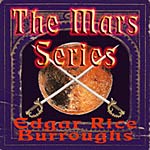
Actor David Stifel narrates serialized readings of Edgar Rice Burroughs novels, currently concentrating on the Mars Series. The first novel, A Princess of Mars, is complete with new episodes released every Wednesday and Saturday night.
Why is it awesome?
First, it’s the Edgar Rice Burroughs Mars Series! One of the greatest pulp SF stories ever written. If you disagree I don’t think we can be friends anymore. There. I said it. Secondly, as if ERB was not enough to get you to tune in, David Stifel, "That Burroughs Guy," delivers an excellent performance that you have to hear. His voice just seems tailor-made for Barsoomian adventure and his entusiasm and love for the material come across throughout. If you’re at all familiar with Burroughs’ work you know every chapter ends with a cliff-hanger. You just have to turn the page to see what happens next and so too with this podcast. I flew through A Princess of Mars in just a few sittings. With the John Carter movie coming out next year now is a perfect time to get to know the source material before Disney botches it. (For the record, I think the trailer looks very promising but how many times have we been burned by a great trailer?) Until next time, Mr. Stifel, stay fantastic!
The Tolkien Professor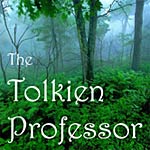
Founded in order to connect with other people who are eager to be included in a thoughtful literary conversation about the works of J.R.R. Tolkien. Since July 2009, listeners have downloaded more than 1,200,000 lectures.
Why is it awesome?
This podcast is simply a must for any Tolkien fan! I’m talking books here, not movies. I promise, even if you’ve read The Lord of the Rings a dozen times, like I have, you probably don’t know half of what The Tolkien Professor, Corey Olsen, knows about Tolkien’s world. This guy is amazing. He breaks down the books chapter by chapter and shows you things that you you never knew were there. Who knew there was so much going on in The Hobbit? Your appreciation for Tolkien will reach new heights with each episode. And don’t let the word "lecture" scare you off, either. This is no dull Freshman requirement lecture we’re talking about. Professor Olsen has an easy way about him and a passion for all things Middle Earth that makes each episode pass before you know it. This road goes ever on and on and you’ll love every step of the way.
Escape Pod: The Science Fiction Podcast Magazine
Escape Pod is the premier science fiction podcast magazine. Every week we bring you short stories from some of today’s best science fiction authors, in convenient audio format for your computer or MP3 player.
Why is it awesome?
If you’re looking for some great short science fiction, look no further than Escape Pod. This show has been around for a long long time and just seems to get better with age. This is probably the first podcast you thought of when you saw the title of this post – it’s that good. Escape is the operative word here. These stories will take you away to wonderful places for a little while and, like any good story should, this podcast will leave you wanting more. It’s like SF crack for your ears. Give it a listen – everybody’s doing it….
The Coode Street Podcast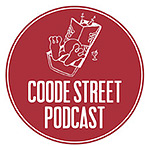
The Coode Street Podcast is the British Science Fiction Award-nominated science fiction and fantasy podcast hosted by noted critic Gary K. Wolfe and anthologist/editor Jonathan Strahan. It features discussion and digression on topics related to science fiction and fantasy.
Why is it awesome?
The Coode Street Podcast is one of the smartest SF/F podcasts you’re likely to come across. These guys are industry veterans who really know their stuff and they’re letting us listen in as they discuss, in depth, the hot topics in genre fiction like the state of the publishing industry, the Science Fiction Encyclopedia and genre awards etc. It’s very much like listening in on a party line where the particpants are unaware we’re even there. You’ll get the distinct feeling that they would have these very same conversations even if there were no microphone around.
Have a listen to these shows – or any of the others on our list. There is something for everyone when it comes to science fiction and fantasy podcasts so you’re sure to find some you can’t pass up. If you know of any good SF/F podcasts that focus on the literature side of genre fiction that we should have on our list let us know. Enjoy!
Science Fiction & Fantasy Series
Most Science Fiction and Fantasy fans like a good series. Once we find a book we like we want to return to that universe time and again for more great adventures with the characters and settings we already know. Of course, Science Fiction and Fantasy authors and publishers are only too happy to indulge our obsession. Indeed, single stand-alone books are becoming a thing of the past with trilogies or better being the norm. More is more these days.
Our new list of Science Fiction & Fantasy Series contains all of the series in the WWEnd database for your easy perusal. So whether you’re looking for a trilogy, tetralogy, pentalogy, hexalogy, heptalogy, octalogy, ennealogy or decalogy you’ve come to the right place. We’ve even got a trigintoctology for you serious gluttons.
Of course, if you’re a WWEnd Member you’ll be able to use BookTrackr™ to monitor your progress with the series you’re reading and tag those that you want to read later. Check it out and let us know what you think of the list. What series have we missed that you’d recommend to your friends? Which series are your favorites? Full points if you can tell me how many books make up a trigintoctology and the name of the series we’re referring to. Enjoy!
Another Earth
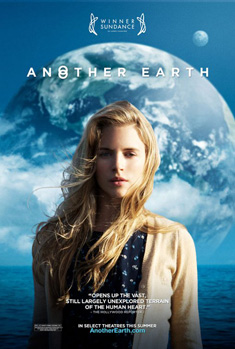 Another Earth is a rare, perfect balancing act between genre decadence and indie melodrama. The genre elements are obvious from the title and the poster art, and they are schlocky enough to make the staunchest defender of sci-fi weirdness run for the hills. Another planet is discovered nearby that can support life. Soon it becomes apparent that this planet is in our solar system and has a continental structure mirroring our own. As the planet draws closer—but never, for some reason, too close—we can see cities and other indications of intelligent life, though there is a bizarre amount of radio interference preventing us from contacting anyone on the planet. It’s not long before this planet is dubbed “Earth 2,” as it becomes more and more obvious that it is an exact replica of our home world. An Australian billionaire begins planning a shuttle flight to Earth 2, with a public essay competition for choosing other passengers.
Another Earth is a rare, perfect balancing act between genre decadence and indie melodrama. The genre elements are obvious from the title and the poster art, and they are schlocky enough to make the staunchest defender of sci-fi weirdness run for the hills. Another planet is discovered nearby that can support life. Soon it becomes apparent that this planet is in our solar system and has a continental structure mirroring our own. As the planet draws closer—but never, for some reason, too close—we can see cities and other indications of intelligent life, though there is a bizarre amount of radio interference preventing us from contacting anyone on the planet. It’s not long before this planet is dubbed “Earth 2,” as it becomes more and more obvious that it is an exact replica of our home world. An Australian billionaire begins planning a shuttle flight to Earth 2, with a public essay competition for choosing other passengers.
Even the indie elements are cliched to anyone who has watched enough independent films. Rhoda Williams is a 17 year old high school student who causes a drunken car collision after a party celebrating her acceptance to MIT, coincidentally the same night Earth 2 is discovered. She spends four years in prison, after which time her spirit has been broken and her guilt has eaten her from the inside out. Subsequent to her release, she seeks out the only other survivor of the car crash, a music professor and composer who has since left his university post and spends his days in a drunken stupor (shades of Kieslowski’s Blue, perhaps?). Too cowardly to admit who she is when she first meets him, she instead pretends to be an employee of a cleaning service, and she begins working out a sort of penance by putting his house in order once a week. The way their relationship progresses from there will not be a surprise to indie fans.
Despite the genre decadence on both the sci-fi and indie sides, the movie still pulls together unpretentiously. Perhaps it even works because of the genre predictability, much as how Shaun of the Dead worked so well because each of the genres it mashed together—romance, horror and comedy—integrated all the predictable cliches. Playing various genres off of one another is something comic book writers have been doing for decades, and now filmmakers are beginning to toy with the idea in larger productions like Cowboys and Aliens. Maybe we’re seeing the start of a trend.
At its core, Another Earth is a story about the choice between forgetting the past and honestly facing yourself. When we do something horrible, can we face that courageously or will we hide from the world, even when it comes racing at us through space? Highly recommended.
Banned Science Fiction & Fantasy Books
A recent blog post about Slaughterhouse-Five being banned (yet again) got us to thinking: How many other SF and fantasy books have been banned over the years? How many are banned right now? Then, we looked at all of the lists we maintain and realized there might be one list that doesn’t yet exist… perhaps the most necessary list of all: Banned Science Fiction & Fantasy Books. To celebrate the launch of our new list, we thought we’d discuss just a few of them.
There are many reasons a book might get banned. Here are three examples from our list.
Politics
Animal Farm had problems getting published from the very beginning. George Orwell tried to publish it in the early 1940s, but publishers were loath to print anything that might threaten the British alliance with Russia. When Orwell finally did publish it in 1945, his preface on the English self-censorship was itself censored from the print runs.
In 1963 the John Birch Society challenged its status in Wisconsin schools, despite its anti-communist stands, simply because it contained the phrase "masses will revolt." Just in case that wasn’t ironic enough, a district in Georgia received challenges to the book because it had objectionable "political theories." The same thing happened in New York state because, a study concluded, "Orwell was a communist." At least the Russians understood what Animal Farm was about when they suppressed its presentation at their 1977 book faire!
The most recent attempt to ban Animal Farm was in 1987, in a fascinating case where the banning of one book (for obscenities) led to the district having to ban 64 classics out of consistency, which also included (or should we say excluded) 1984. The embarrassment led the district to eventually reinstate all of these books.
Today, it’s more autocratic regimes that tend to proscribe the book. In 1991, Kenya quashed the stage adaptation of Animal Farm, because it criticized corrupt leaders and Kenya’s one-party rule was, well, corrupt. Most recently, in 2002, the United Arab Emirates banned it for "contradicting Islamic principles."
Sex
It came as no surprise to me that Stranger in a Strange Land is often banned for sexual content. It is, after all, a very sexy analysis of the Sapir-Whorf hypothesis. What did surprise me was that Brave New World is challenged even more for the same reason. It was banned right out of the gate in Ireland in 1932, for being "anti-family" and "anti-religion." Today, parents are far more likely to object to the fact that it addresses sexual promiscuity. Nevermind that Huxley himself was depicting the sexual acts as a negative example of disconnecting love with the act.
In many ways, his novel’s ban confirms Huxley’s own predictions. In this classic dystopian novel, all pain is eliminated so that citizens won’t have to deal with the burdens of knowledge. One California school board might have been thinking the same when they decided the classic contained too many "negative activities." Apparently, students were only supposed to think happy thoughts. Perhaps it is incidents like these that lead Huxley to proclaim, in 1959, that the dystopia he foretold is developing far faster than he originally predicted.
Religion
The second most challenged book(s) in 2010 was Philip Pullman’s very popular His Dark Materials Trilogy. Far from being sorry about it, Pullman must be thrilled. It wasn’t too long ago that he expressed surprise that so many people were objecting to Harry Potter, yet weren’t more upset about his books. After all, he exclaimed, "My books are about killing God." Well, Mr. Pullman, you got what you wished for. Bill Donahue, of the Catholic League, has called for a boycott Pullman’s works, describing it as "atheism for kids." A boycott isn’t a ban, however. In fact, it’s democracy in action. If you don’t agree with a book, then don’t buy it.
Making decisions for your whole community is another matter. The Halton Catholic school district went that extra step in 2007, when they pulled the His Dark Materials series from their shelves (while still allowing students to request the books from behind the counter). Shortly thereafter, the Calgary Catholic School district also pulled books from their library shelves. To their credit, after reviewing these decisions, both districts restored His Dark Materials to the shelves. The Calgary board noted, "There is no doubt that the text is harsh in terms of its language about organized religion and that it presents a consistently negative view of church, clergy and faith-based institutions; however, there are glimpses of light with opportunities for positive reflection." Criticism of the Church, they added, can be better answered without censorship, so that Catholic teachers can answer the criticism.
Although the Catholic districts (and there were far more than these two) got a lot of attention for trying to ban His Dark Materials, they were private institutions (albeit, ones that received government funding). Public districts, however, have received challenges so often that only a book about gay penguin dads beat it out for the most challenged book of 2010. Better luck next time, Mr. Pullman.
Lest you think we’ve told the whole story of banned SF/F books, know that we have merely scratched the surface. No doubt there are other SF/F books that have been banned or heavily challenged so if you know of any that we should include here please let us know, and we’ll add them to the list.



















 Full Details
Full Details
